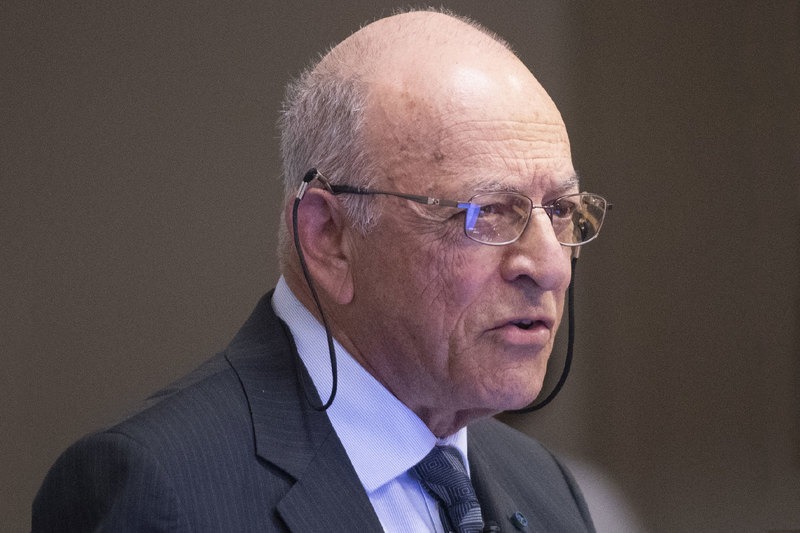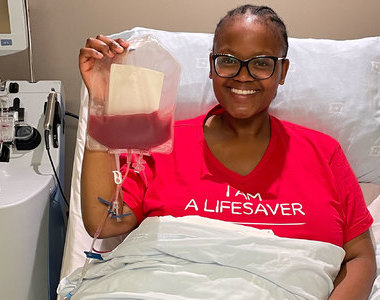Department of Medicine celebrates Emer Prof Solly Benatar
16 March 2022 | Story Nicole Forrest. Photo Brenton Geach. Voice Cwenga Koyana Read time 7 min.
The University of Cape Town’s (UCT) Department of Medicine honoured Emeritus Professor Solomon “Solly” Benatar with a symposium on Thursday, 10 March, as a belated celebration of his 80th birthday.
A small group – including Emeritus Professor Benatar and his family – attended the hybrid event at UCT’s Neuroscience Institute, while the remainder of the audience joined online.
According to the deputy head of the Department of Medicine at UCT and Groote Schuur Hospital (GSH), Professor Graeme Meintjes, the aim of the symposium was not only to reflect on the outstanding contributions Benatar has made to the university and medical profession, but also to provide context for those contributions.
“The programme has been designed to mirror the academic journey that Professor Benatar has taken through his career, from clinical medicine [to] respiratory medicine, bioethics, human rights, healthcare systems and health disparities, and global health issues.
“However, the objective of today’s symposium is not merely to reflect on Professor Benatar’s contributions but [also] to provide historical and contemporary perspectives on each of the academic fields to which he has contributed in his scholarly work,” said Professor Meintjes.
Kindness, bravery and moral fortitude
Benatar, who was born on 6 February 1942, held many prestigious positions throughout his extensive career. During his tenure at UCT, he was the head of the Department of Medicine from 1980 to 1999 and chief physician at Groote Schuur Hospital from 1980 to 2007. He was also the founding director of the UCT Bioethics Centre (1992 to 2012).
In addition to this, Benatar was the president of the International Association of Bioethics (2001 to 2003) and a professor at the University of Toronto’s Dalla Lana School of Public Health (2008 to 2012).
The three-hour programme followed the path of Benatar’s career – from his time focusing on clinical and mentor work, pulmonology, the development of bioethics and overcoming persistent health disparities in South Africa to his international research of health ethics and the political economy of global and planetary health.
What was clear from the outset was how much of an impact Benatar had throughout his career, both as a colleague and a mentor. “I really want to emphasise that, in terms of the standing within our communities, the university, our country and the world, our department owes much to Solly’s contributions in his many roles,” said Meintjes.
Elaborating on this, the chair and head of the Department of Medicine, Professor Ntobeko Ntusi, traced the path of Benatar’s career, noting how the then head of Medicine at UCT and GSH was able to enact a course correction for a department that was in turmoil.
“Many remember him for his bravery and moral fortitude, his unsurpassed intellect and ever-present clarity of thought and speech.”
“Solly became the fifth chair and head of department at UCT and GSH in 1980. He inherited a department that faced challenges like frequent political boycotts and the ongoing flight of experienced staff into the private sector or overseas. Despite this, Solly managed to stabilise and grow the Department of Medicine during his tenure,” noted Professor Ntusi.
The ability to overcome challenges that may have been insurmountable for others, Ntusi said, was down to Benatar’s strength of character – something that many who worked with and for him could attest to.
“Many of his contemporaries remember Solly as a kind, supporting and caring head of Medicine who always had time to stop and listen. Many remember him for his bravery and moral fortitude, his unsurpassed intellect and ever-present clarity of thought and speech, which was evident whenever he spoke up against injustice – be it in a faculty board meeting, in the university senate, or when writing in a newspaper article.
“Like the other giants in the line of leadership in UCT’s Department of Medicine, Solly left an indelible mark on the identity and soul of this department in its 103-year history. It is indeed upon the timeless imagination, the laughter in the dreams of this brave leader, that the foundation of our very existence and our success as a department rests,” he added.
Humanity and magnanimity
With each of the speakers who took to the stand, Benatar’s magnanimity and genial nature were two aspects that stood out across the board. For example, Professor Robert Dyer of UCT’s Department of Anaesthesia and Preoperative Medicine recalled an interaction he had with Benatar early in his career.
“It was the end of a night shift and I came in from the balcony at the end of Ward D1 when Professor Benatar arrived at 05:45, which was not unusual for him. He greeted me and said, ‘You realise that you’re very lucky because you’re here at six in the morning looking out over the Stellenbosch mountains, and everybody else is stuck in bed and they don’t see this.’
“That was a real illustration of his vision and his humanity, to see me and appreciate my growth and interests.”
“I thought to myself that that was a unique take on things, but the man had a good point. That was the first thing Professor Benatar taught me: Be thankful for the fortunate position you’re in,” he said.
Professor of Clinical Pharmacology Gary Maartens described Benatar’s humanity and desire to see those around him excel. “At the end of my registrar training, Solly called me in for my career checks and asked me what I wanted to do. I said that I was interested in infectious diseases.
“Although UCT didn’t offer infectious diseases at the time, he set up training for me with a microbiologist and arranged a fellowship in the UK. So there was an instant vision of there being something interesting and new. That was a real illustration of his vision and his humanity, to see me and appreciate my growth and interests,” Professor Maartens said.
Echoing this, Executive Director: Education and Assessment at the Colleges of Medicine of South Africa Professor Vanessa Burch spoke about not only experiencing this humanity in a professional sense but also a personal one.
“You have been extremely successful in your career. You’ve done extraordinary things, and people have spoken about your academic ability, your leadership and your mentorship, but I can attest to how you dealt with people as a physician. When I was a patient, you came to sit at my bedside, which meant a great deal during that difficult time,” she said.
No fewer than six more speakers attested to Benatar’s outstanding professional achievements and personal virtues, highlighting the indelible impact he has had on both UCT and the medical profession at large.
 This work is licensed under a Creative Commons Attribution-NoDerivatives 4.0 International License.
This work is licensed under a Creative Commons Attribution-NoDerivatives 4.0 International License.
Please view the republishing articles page for more information.
Listen to the news
The stories in this selection include an audio recording for your listening convenience.























































































































































































































































































































































































